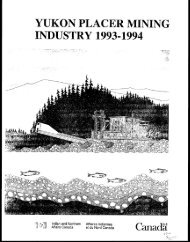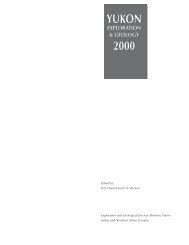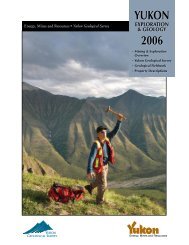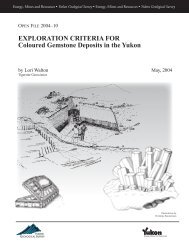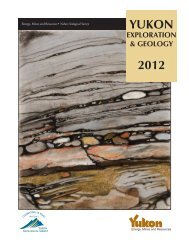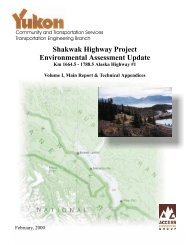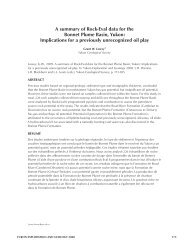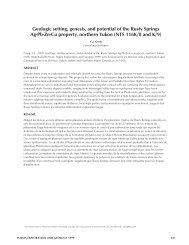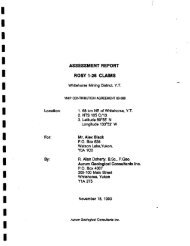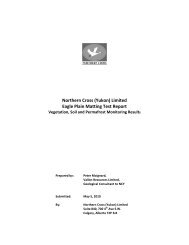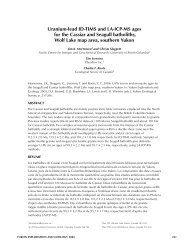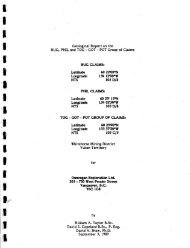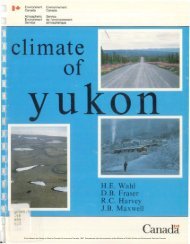WhiteCAP_Plan_01SEPT..
WhiteCAP_Plan_01SEPT..
WhiteCAP_Plan_01SEPT..
Create successful ePaper yourself
Turn your PDF publications into a flip-book with our unique Google optimized e-Paper software.
Northern Climate ExChange <strong>WhiteCAP</strong> Draft <strong>Plan</strong><br />
<strong>WhiteCAP</strong> is a community planning process. The broader community was engaged<br />
through a series of open houses, beginning with an introductory open house in June<br />
2009 to promote the project. Members of the community were then invited to participate<br />
in a workshop or community input session to discuss how climate change may<br />
exacerbate vulnerability in the Whitehorse region. A second open house was held<br />
shortly after to report on the results of the community input session and provide the<br />
broader community the opportunity to contribute to the scenarios. A third open house<br />
was held in the fall of 2010 to provide the community the opportunity to comment on the<br />
plan (anticipated). A final open house is scheduled for the summer of 2011 to report on<br />
the findings of the finalized plan and on community projects completed during the<br />
second year of <strong>WhiteCAP</strong>. In all, four open houses and three workshops will have been<br />
held in the community over the two years of the adaptation project, from June 2009 to<br />
June 2011.<br />
Climate Change and Whitehorse<br />
Climate change projections show how the Whitehorse region may be altered by shifting<br />
temperature and precipitation. Shifts in temperature and precipitation will have spin-off<br />
effects that will enhance vulnerabilities or establish opportunities for the community.<br />
Projected mean annual temperature and seasonal temperatures for the Whitehorse area<br />
were estimated for 2030 and 2050. Projected increases indicate that warming will differ<br />
seasonally, and that winter period will experience the most significant warming –<br />
increasing 3.3°C to 5.4°C. Mean annual precipitation is anticipated to increase from<br />
585mm to 638 to 657mm by 2050. Seasonal precipitation is expected to increase<br />
throughout the year, with the greatest increases occurring in the winter and fall. Winter<br />
precipitation is projected to increase between 11.3% and 13.9%, while autumn<br />
precipitation is projected to increase between 9.4% and 12.9%. Based on the projected<br />
shifts in temperature and precipitation, the growing season for Whitehorse is expected to<br />
increase; rising from 150 days to 168-175 days by 2050, an addition of 18-25 days. The<br />
growing season was estimated based on projected changes to seasonal freeze-up and<br />
thaw dates in the Whitehorse region.<br />
Identifying Adaptations to Climate Change in Whitehorse<br />
Each adaptation was assessed to determine how well it addresses the consequences of<br />
climate change identified in Tier II of the risk assessment. A priority response was<br />
characterized by fit (how well it benefits the broader community), whether it is win-win,<br />
and whether it builds adaptive capacity. Of the 245 adaptations suggested by the<br />
community, 49 were determined to leverage community capacity appropriately. These<br />
49 adaptations indicate that a broad range of actions are required across many<br />
disciplines to adequately prepare for climate change. These actions can be integrated<br />
into existing projects and programs to increase the efficiency of responding to climate<br />
change. This is called “mainstreaming”.<br />
Mainstreaming Climate Change in Whitehorse<br />
Ongoing processes into which climate change adaptations can be integrated include<br />
land-use/local area planning (e.g. City of Whitehorse Official Community <strong>Plan</strong>),<br />
sustainability planning, emergency response planning and infrastructure planning. A<br />
ii



